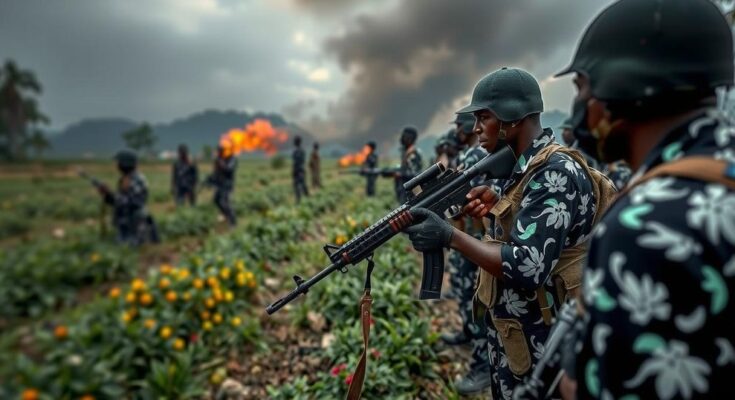Angola accuses the Rwanda-backed M23 rebels of violating a ceasefire with clashes in eastern DRC. This situation escalated with the M23’s occupation of Kalembe, which Angola condemned, fearing for the peace process. The M23 has captured significant territory since 2021, worsening the humanitarian crisis in the region.
Angola has formally accused the M23 rebel group, reportedly supported by Rwanda, of breaching a ceasefire agreement in the eastern region of the Democratic Republic of the Congo (DRC). This ceasefire, established in early August through Angolan mediation, was intended to quell tensions between the DRC armed forces and the predominantly Tutsi M23 militia. However, a violent confrontation occurred on Sunday in North Kivu province between the M23 and a government-aligned militia known as Wazalendo. The Angolan government stated that the M23’s actions leading to the capture of the town of Kalembe constituted “a flagrant violation” of the ceasefire. In a statement released on Monday, Angola condemned this act, emphasizing that it undermines ongoing peace efforts in the region. Local reports indicated that the conflict resumed early Sunday morning, ultimately allowing M23 forces to take control of Kalembe later that day. Wazalendo’s spokesperson, Marcellin Shenkuku, voiced that his militia had regained control of the town. Importantly, he noted that there were no official Congolese armed forces present during the clashes. The nature of Angola’s response is noteworthy, as governmental statements on military conflicts in the region are rather infrequent. The M23 group has been active since late 2021 and has captured extensive territories in eastern DRC, leading to widespread displacement and a significant humanitarian crisis. Kalembe, a strategically important town with approximately 40,000 residents, provides access to valuable mineral resources. This area has been a historical battleground for various armed factions and remains deeply affected by complex internal and external conflicts.
The situation in eastern DRC has been exacerbated by decades of conflict involving multiple armed groups, primarily focused on control over mineral-rich regions. The M23 movement has roots in grievances related to land and citizenship, with notable Tutsi backing primarily from Rwanda. Mediation attempts, including ceasesfires by neighboring countries like Angola, have often failed to produce lasting peace, leading to recurring skirmishes and violence.
In light of the recent resurgence of violence between M23 rebels and the Wazalendo militia, Angola’s condemnation reflects ongoing tensions and complexities in the region. The conflict’s implications extend beyond immediate military struggles, affecting humanitarian conditions and regional stability. The capture of Kalembe marks another chapter in the M23’s territorial claims, reinforcing the urgent need for comprehensive conflict resolution strategies.
Original Source: www.barrons.com




